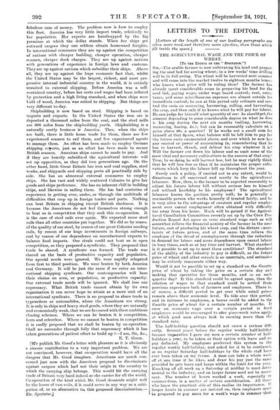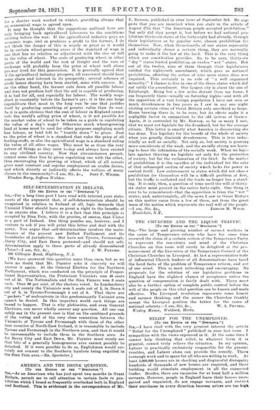LETTERS TO THE EDITOR.
[Letters of the length of one of our leading paragraphs are often more read,and therefore more effective, than those which fill treble the spaCe.]
THE AGRICULTURAL WAGE AND THE PRICE OF WHEAT.
[To THE EDITOR or THE " SPECTATOR."1 Sta,—The arable farmer is now cultivating his land and prepar- ing the seed bed for sowing wheat; in a few weeks' time drilling will be in full swing. The wheat will be harvested next summer and will come into the market twelve to eighteen months hence; who knows what price will be ruling then? The farmer has already spent considerable sums in preparing his land for the seed bed, paying wages under wage board control; rent, rates, taxes, and some miscellaneous expenses are almost outside his immediate control; he can at this period only estimate and con- trol the costs on manuring, harrowing, rolling, and harvesting the crop, and then only if he knows what he will pay for labour. He can judge for himself what quantitybf con he should get, the amount depending to some considerable degree on what he does ti his crop during the next six months (rolling, harrowing, manuring, hoeing, &c.); but can he reasonably calculate on a price above 40s. a quarter? If he works out a small sum for himself at that figure, what balance will be left him to pay for the future costs enumerated above, and over which be now has any control ex-power of economizing in, remembering that he has to harvest, thresh, and deliver his crop whatever it is? Will the farmer cut down his labour and so omit some of the most vital and necessary cultivations to the success of that crop? True, by so doing he will harvest less, but he may rightly think that he will lose less 60 than if he maintains the proper culti- vations which keep the labour bill up throughout the year.
Surely such a policy, if carried out to any extent, would be disastrous to all concerned and mostly to the agricultural labourer. How, then, is the farmer to be expected reasonably to adjust his future labour bill without serious loss to himself and without hardship to his employees ? The agricultural labourer knows the position pretty well; ho is generally a reasonable person who works honestly if treated fairly, and he is very alive to the advantage of constant and regular employ- ment over casual employment often obtained with difficulty far away from his home. Much will be gained if the Agricul- tural Conciliation Committees recently set up by the Corn Pro- duction Repeal Act agree on some standard wage such as will somewhat relieve the financial anxiety of the farmer in the near future, cost of producing his wheat crop, and the distant uncer- tainty of future prices, and at the same . time relieve the employee of the dread of unemployment through the reduction in demand for labour and more dependence upon casual labour in busy times, such as at hay time and harvest. What standard is it possible to set up to meet these conditions? The standard of the ability of the industry to pay is difficult, as the future price of wheat and other cereals is so uncertain, and estimates may be entirely inaccurate either way.
Would it not be possible to set up a standard on the Gazette
price of wheat by taking the price on a certain day and making that operative for three months, and so on each quarter day? If this standard could be agreed upon, then the relation of wages to that standard could be settled from previous experience both of farmers and employees. There is, of course, a difficult period to get over while retail prises remain above their economic level. To tide over this period, and in fairness to employees, a bonus could be added to the Gazette price of wheat for a certain number of months. If once an economic wage over a certain period is fixed employers would be encouraged to offer piece-work rates again, at which good men always look to earning more than tuts standard rate.
The half-holiday question should not cause a serious diffi-
culty. Several years before the regular weekly half-holiday became imperative I gave my men a certain number of half- holidays a year, ito be taken at their option with leave and no pay deducted. My employees preferred this system to the regular weekly half-holiday, and asked for it to be continued, so no regular Saturday half-holidays by the whole staff have ever been taken on my farms. A man can take a whole week off at one time if he likes, and draw his pay just the same provided Ile gets leave and keeps within the limit for the year. Knocking off all work on a Saturday at midday is most detri- mental to the industry, and on larger farms need not be neces- sary. The number of hours worked a week, especially in summer-time, is a matter of serious consideration. All those who know the practical side of this realize its importance. If longer hours in summer are insisted on, then employers must be prepared to pay more for a week's wage in summer than
for a shorter week worked in winter, providing always that an economical wage is agreed upon.
It may be thought that the suggestions outlined here are only bringing back agricultural labourers to the conditions existing before the war. If the agricultural industry pays an economic wage, and so produces a profit to the farmer, I do not think the danger of this is nearly so great as it would be in certain wheat-growing areas if the standard of wage is one that has no relation or adjustment with the rise or fall in the value of wheat. The costs of producing wheat in other parts of the world and the cost of freight and the rate of exchange will probably keep the price of wheat well above pre-war level for this generation. It is generally agreed that if the agricultural industry prospers, all concerned should have some share and interest in its prosperity; several schemes of profit bonus sharing have been started, some with success. If, on the other hand, the farmer cuts down all possible labour and does not produce half that the soil is capable of producing, it is bad for all, and especially for labour. The weekly wage- sheet is constantly before the farmer's eye; it is the one large expenditure that must in the long run be one that justifies itself by producing something of greater value than its cost. As it is quite obvious that the cost of labour in England cannot rule the world's selling price of wheat, is it not possible for the market value of wheat to be taken as a guide in regulating the value of a day's wage? Otherwise much wheat-growing land at home must be used for other purposes employing much less labour, or land left to " tumble down " to grass. Just as the price of wheat is a standard that rules the price of all feeding-stuffs, so also the agricultural wage is a standard ruling the value of all other wages. This must be so from the very nature of things as they exist to-day and always have existed in any civilized country. Now that circumstances permit, cannot some clear line be given regulating one with the other, thus encouraging the growing of wheat, which of all cereals gives most constant and regular employment on arable farms, and which directly or indirectly affects the welfare of many classes in the community?—I am, Sir, Ize., JOHN F. Wallas.
Elmdon Bury, Saffron Walden.



































 Previous page
Previous page